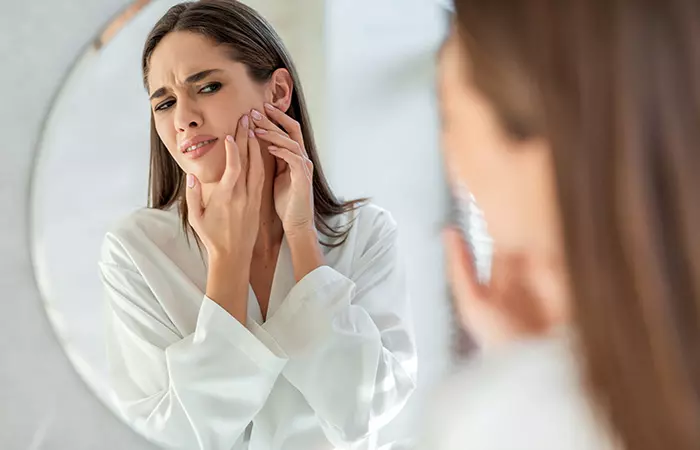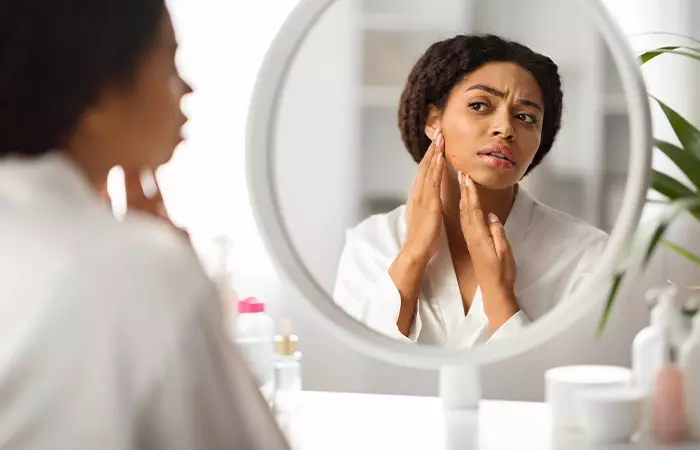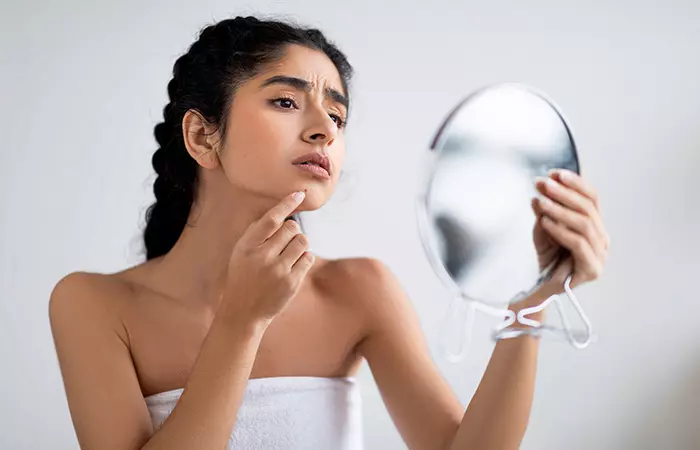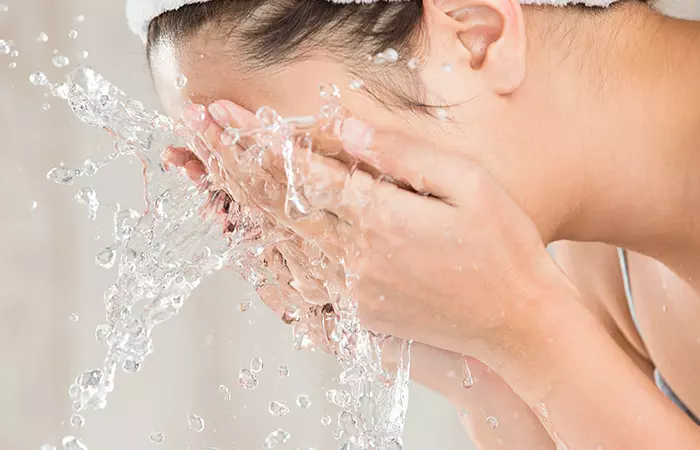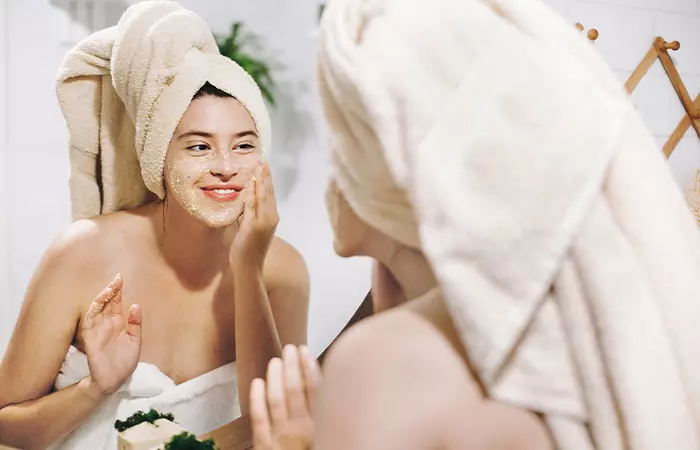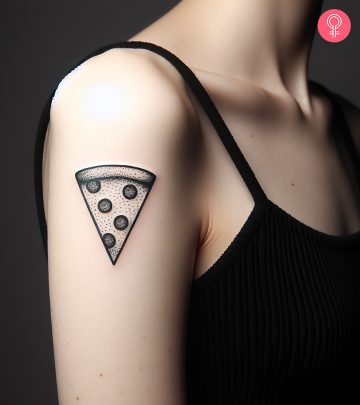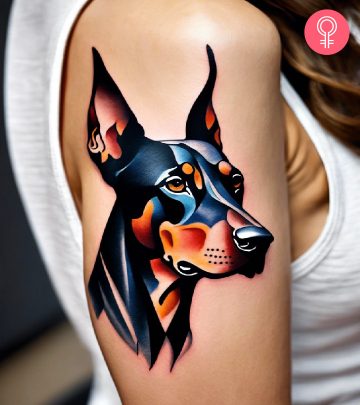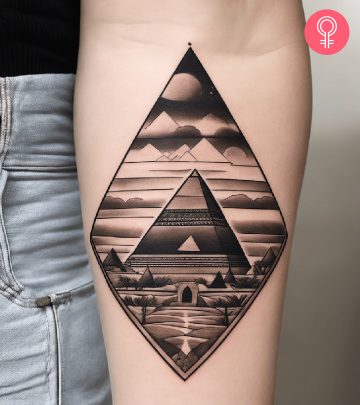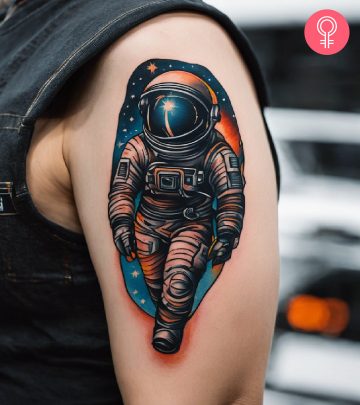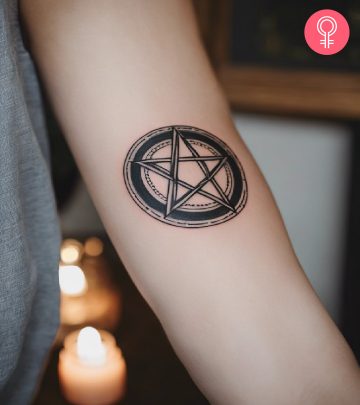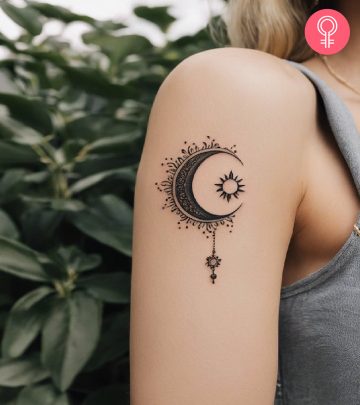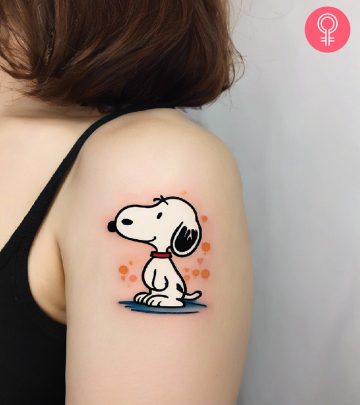Why You Should Never Pop Your Pimples?
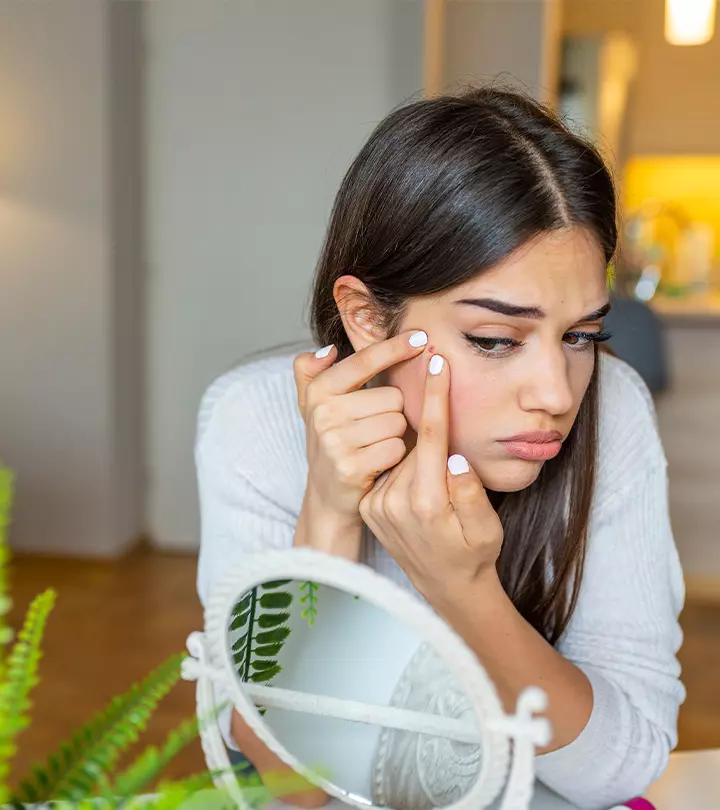
Image: Shuterstock
Your skin serves as a reflection of your overall health. It also contains pores that are susceptible to clogging from oils and pus. This is why breakouts tend to manifest prominently on your face. While the temptation to squeeze and pop pimples may be strong, it’s important to resist this urge, as it can have adverse effects on your skin. In this article, we will explore the reasons why popping pimples is not a recommended practice. Read on!
In This Article
What Are Pimples And What Causes Them?
Pimples are a prevalent skin condition triggered by hormonal fluctuations or an overabundance of skin oils. They appear as raised red lumps with a white center and develop when bacteria infiltrate blocked hair follicles. While commonly associated with teenagers, adults can also experience this condition. Factors such as hormonal changes, dietary choices, medication usage, and stress can exacerbate the appearance of pimples, making them more noticeable and challenging to manage.
Why You Should Never Pop Pimples Near Your Nose
The perilous region known as the “danger triangle” of the face lies between the bridge of the nose and the corners of the mouth. This area is considered one of the most hazardous zones on the face, where popping a pimple is strongly discouraged. The presence of blood vessels directly connected to the brain poses a significant risk if bacteria enter through broken skin (1). This can lead to potential health problems, making it crucial to avoid manipulating or popping pimples in this sensitive region.
Here are a few reasons why you should refrain from popping your pimples.
1. Popping The Pimple Won’t Solve The Problem
Opting to squeeze a pimple is not a prudent decision and can result in more harm than good. The act of squeezing can open up the pores, allowing bacteria to penetrate deeper into the skin. Consequently, this may lead to increased swelling and redness, exacerbating the condition rather than resolving it. It’s essential to refrain from squeezing pimples to avoid further complications and promote healthier skin.
2. It Might Leave Scars Behind
Following the squeezing of a pimple, residual spots often persist on the face, resembling scars. The affected skin may exhibit hyperpigmentation, appearing darker than the surrounding normal skin, or hypopigmentation, appearing lighter. These variations in skin color can be quite noticeable, and it’s important to be aware of the potential consequences of popping pimples to avoid such discoloration.
3. It Will Delay The Healing Process
Popping a pimple can significantly prolong the healing process, extending it up to 2 weeks, compared to the typical 3 to 7 days it takes for a pimple to naturally disappear. It’s crucial to resist the urge to pop pimples to avoid unnecessary delays in the healing and recovery of your skin.
4. It Can Cause More Pimples
When you pop a pimple and release the bacteria, oils, or debris, they have the potential to spread into neighboring pores, leading to the formation of more pimples on otherwise clear skin. This chain reaction of bacterial transfer can result in a more widespread breakout, making it essential to avoid popping pimples to maintain the health of your skin.
How To Prevent Pimples From Occurring
Incorporating simple practices into your skincare routine can significantly reduce the likelihood of breakouts. By adopting these small but essential habits, you can promote healthier and blemish-free skin.
1. Adopt A Consistent Skincare Routine
Establishing a regular skincare routine is the foundation for preventing breakouts. This should include cleansing, toning, and moisturizing twice daily. Choose products suitable for your skin type, as using harsh or unsuitable products can aggravate the skin and trigger breakouts.
2. Cleanse Your Face Gently
Use a gentle, sulfate-free cleanser to wash your face. Avoid harsh scrubbing, as it can strip the skin of its natural oils, leading to increased oil production and potential breakouts.
3. Manage Stress
Stress can contribute to hormonal imbalances that trigger breakouts. Practice stress-relief techniques such as meditation, yoga, or deep breathing exercises to promote overall skin health.
4. Exfoliate Regularly
Incorporate exfoliation into your routine once or twice a week to remove dead skin cells and unclog pores. Choose a gentle exfoliator with round microbeads to avoid damaging the skin.
5. Avoid Touching Your Face
Our hands carry dirt, bacteria, and oils, which can transfer to the face and contribute to breakouts. Avoid touching your face throughout the day to reduce the risk of introducing harmful elements to your skin.
6. Watch Your Diet
Although there is limited scientific evidence directly linking diet to breakouts, some people may find that certain foods, such as sugary or greasy foods, can worsen their skin condition. Pay attention to how your skin reacts to different foods and adjust your diet accordingly.
7. Keep Your Hair Clean And Away From Your Face
Oily hair can transfer oils to your face, leading to breakouts along the hairline and forehead. Keep your hair clean and tie it back when possible to minimize contact with your skin.
8. Don’t Overwash Your Face
While cleansing is crucial, excessive washing can strip the skin of its natural oils, prompting it to produce more oil, potentially leading to breakouts. Stick to the recommended twice-daily cleansing routine.
9. Cleanse After Sweating
After a workout or any activity that causes sweating, cleanse your face to remove sweat, oil, and impurities that can clog pores.
10. Avoid Heavy Or Greasy Makeup
Opt for lightweight, oil-free makeup products to allow your skin to breathe. Heavy or greasy makeup can trap dirt and bacteria, leading to breakouts.
11. Change Pillow Cases Regularly
Dirty pillow cases can harbor bacteria, oils, and dead skin cells that transfer to your face as you sleep. Change your pillowcases regularly, at least once a week, to maintain clean bedding for clearer skin.
By adopting a gentle cleansing routine, avoiding harsh products, keeping your hands away from your face, and maintaining a healthy lifestyle, you can significantly reduce the occurrence of breakouts and achieve clear and radiant skin. Embrace a comprehensive approach to skincare, and you’ll be on your way to preventing breakouts and enjoying a glowing complexion. So, what is your secret to pimple free skin? Let us know in the comments section!


